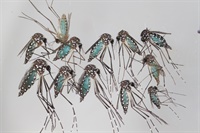Arbovirus surveillance of tomorrow
- Average Rating:
- Not yet rated
- Categories:
- Webinar Archive
- Faculty:
- Nathan D. Burkett-Cadena, PhD
- Course Levels:
- All Levels
- Duration:
- 1 Hour Session
- Format:
- Audio and Video
- License:
- Never Expires.
Description
Early detection of arbovirus transmission is critical for timely implementation of preventative measures. Many current surveillance techniques rely upon infection in vertebrates (humans, domestic, wild or sentinel animals) or vectors (pool screening) to detect arbovirus transmission. Techniques that reduce the time to detection increase the time available to implement preventative measures. A major advance in arbovirus surveillance was developed by a team from Australia exploiting sugar feeding by trapped mosquitoes. This idea to use preservative filter papers, soaked in honey or other sugar source in order to collect and aggregate saliva of trapped mosquitoes. This webinar will cover this technique and how it has been evaluated with three traps (carbon dioxide-baited light trap, gravid trap and resting trap) in Florida to detect zoonotic arboviruses from mosquitoes. The webinar concludes with various ideas on potential future developments and trap modifications to enhance arbovirus surveillance.
Outline:
- Vectors
- Vector-borne pathogens
- Transmission cycles
- Arbovirus surveillance
- Exploiting sugar feeding by mosquitoes for arbovirus surveillance
- Field evaluation of honey cards in Florida
- Future developments and modifications
AMCA Members - This archived webinar along with all AMCA webinars is available free to our active members. We are currently syncing this new system with our database to have seamless identification of our members, but until that is finalized you can access all webinars (live and archived) for free using our membership code which can be found in our member portal here.
Faculty
Nathan D. Burkett-Cadena, PhD Related Seminars and Products
Dr. Nathan D. Burkett-Cadena is Assistant Professor of Entomology at the University of Florida, Florida Medical Entomology Laboratory in Vero Beach, FL. After receiving his PhD in Entomology from Auburn University, Dr. Burkett-Cadena worked as a postdoctoral researcher at the University of South Florida Department of Global Health from 2011-2013. His research interests focus on surveillance and ecology of vector-borne diseases including eastern equine encephalitis virus, Everglades virus, Venezuelan equine encephalitis virus, West Nile virus, epizootic hemorrhagic disease virus and river blindness. Dr. Burkett-Cadena has co-authored over 50 scientific publications related to medically important arthropods and the pathogens that they transmit. He is also author of the book Mosquitoes of the Southeastern United States (2013, University of Alabama Press). He lives with his wife, Marleny, and son, Daniel, in Vero Beach, Florida.
